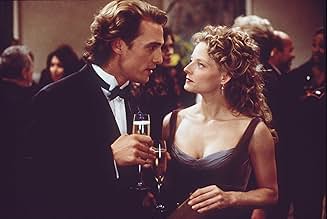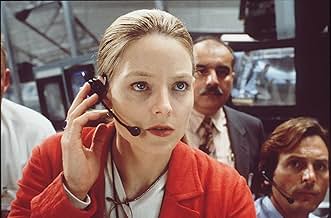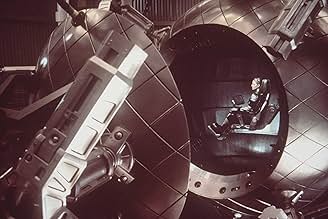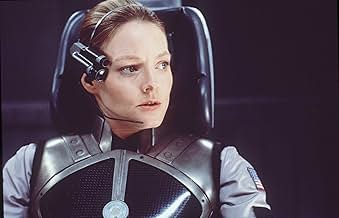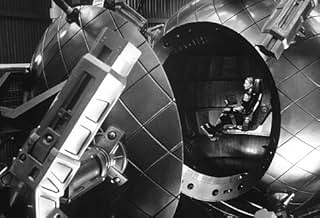ऐली एरोए, खोज के वर्षों के बाद, अलौकिक बुद्धि के निर्णायक रेडियो सबूत पाता है।ऐली एरोए, खोज के वर्षों के बाद, अलौकिक बुद्धि के निर्णायक रेडियो सबूत पाता है।ऐली एरोए, खोज के वर्षों के बाद, अलौकिक बुद्धि के निर्णायक रेडियो सबूत पाता है।
- 1 ऑस्कर के लिए नामांकित
- 14 जीत और कुल 32 नामांकन
Max Martini
- Willie
- (as Maximilian Martini)
फ़ीचर्ड समीक्षाएं
The 90's movies have a certain charm you can not replicate. It makes you belive in better things, makes you want to be better. I liket this movie because it focused on mankind, and not just America. Do not take me wrong. I dont have any problem with America, but there are a lot of things you have to consider besides that nation. I liked the how it made me think about the everlasting parallel between belief and technology. It gives you the right to choose, what you want to belive in. That is a very nice thing nowadays.
I had the luck of watching contact at the cinema when it came out . Being young meant that watching a movie of this grandure in a grand movie theatre with massive screen (something that was dying out at the time) means that this movie has been engraved in my mind .
But it is not due to nostalgia or corrupt memory .
Contact is a thought provoking mind bending movie ahead of its time .
In fact it is the Interstellar of the 90s .
Stunning gorgeous visuals , and a storyline and plot asking some hard questions and providing answers that many might not want to accept as the movie battles between science fitction , science fact and religion in a way that in the end no one is left wanting .
This is not just a movie , this is an event !
Stunning gorgeous visuals , and a storyline and plot asking some hard questions and providing answers that many might not want to accept as the movie battles between science fitction , science fact and religion in a way that in the end no one is left wanting .
This is not just a movie , this is an event !
Ms. Foster's finest work, and the most thoughtful, scientifically accurate film since Kubrick's 2001
In my 61 years, I have seen many science fiction films. Few have exceeded my expectations as this film did. I remember seeing it in a theater (something I rarely trouble myself with these days), and finding myself at times gripping the armrests in excitement. This film builds like great stories should. However, even the best stories can collapse under the weight of a bad script, poor acting, or shoddy editing. I'm happy to say that none of these issues plagued this film. Ms. Foster delivers an extremely powerful performance and is a wonderful role model for women in science. All of the other actors also deliver memorable performances, but make no mistake, it is Ms. Foster's polished performance you will be thinking about when this film ends.
Much has been made of the last 1/4 of this film, with many viewers feeling a let down. I get that. The amazing build up and tension in the third quarter of the film is quite unexpected, but if you approach the final quarter thoughtfully, you'll see that it makes perfect scientific sense. That's rare in any science fiction film pitched to mass audiences. As such, this film makes an amazing contribution to the entire genera.
Much has been made of the last 1/4 of this film, with many viewers feeling a let down. I get that. The amazing build up and tension in the third quarter of the film is quite unexpected, but if you approach the final quarter thoughtfully, you'll see that it makes perfect scientific sense. That's rare in any science fiction film pitched to mass audiences. As such, this film makes an amazing contribution to the entire genera.
N.B: This is a very long monologue because I adore CONTACT to bits.
I loved the irony present in Contact, as well as its religious imagery and its attention to fine detail. To see the universe in that opening scene was breath-taking, and the reason for it all coming out of Ellie's eye becomes blissfully apparent in light of the end, for her journey was just as much a physical as well as an emotional and spiritual one. The photography was superb, alternating between expansive sweeps of the landscape and the universe, and close, intimate shots of the characters, symbolising the potential for the unknown' as well as an equally important knowledge of all that is familiar contact with our own people.
The irony manifested itself in how Ellie, who denounced Palmer's ability to possess complete faith in God, ended up being the advocate of such a faith, though of a different strand; she could now appreciate Palmer's passion. Remember that Biblical verse that when paraphrased reads something like: `The man who is not willing to give up his life will lose it, but he who is willing will gain it'? This religious imagery correlates to how Drumlin lost his life in pursuit of personal acclaim, while Ellie, who admitted that she would freely give up her life in pursuit of life's tormenting questions, gained it in such a memorable and satisfying way. She found inner peace, having made contact with two intelligent races; one of the skies, and one of her own kind. The dried up cliché alluding to aliens: `We are not alone' begins to take on a new meaning in a multitude of dimensions in light of this brilliant movie.
I read this wonderful blurb' about Contact, and I think this following line delineates the film, and why watching Contact became such a defining film for me: `[Ellie's] personal voyage will take her beyond theory, beyond knowledge , beyond experience, to the realization that true vision is ultimately the union of fact and faith.' This duality of life and true fulfilment which arises from the reconcilement of contrary beliefs is surely a theme of the film: evinced through the conflict created by science vs. religion, fact vs. faith, vision vs. reality.
Carl Sagan's novel was also a fulfilling pleasure to read. I thought that the message in pi was an absolutely crucial element of the book, the implications of such a message being that there is an all-powerful force' behind the universe, which brings order to disorder, and such a force' we might call God. So possibly, C.S's novel did prove the existence of God. Maybe the recurring C' pattern in the film, (the quadruple' system Ellie saw near Vega, the sands in her father's hands and that which she holds in the end), is indicative of such order that no matter how large or small an event, i.e, whether a message is written in the sky or in the palm of one's hands, order is present, and implies a powerful force guiding the universe.
I am incapable of seeing many, if any, faults with this film I truly cannot understand why anyone would think it contrived or the same as something as brain-numbing and gung-ho as `Armageddon'. It is truly an intellectual film with meanings at many levels and so thought-provoking! Perhaps Matthew McConaughey's representation of Palmer Joss was a little unbelievable, and the thrice-repeated `It's an awful waste of space' phrase that connected Ellie to her father and Ellie to Palmer can be seen as a tad too sentimental on the one hand, but on the other, it serves to punctuate the potentiality of the physical universe, and the human mind, which, in C.S's case, conceived this book. Jodie Foster is magnificent, but then again, isn't she always? The extraordinary passion Ellie exhibited was admirable her innate sense of wonder balanced by a stabbing loneliness, born out of the premature departure of a dear parent.
I love Contact because of its poignant humanity, the sense of wonder that resonates so strongly throughout the film and indicates the strength of that wonder which inspired C.S in the first place, and because it searches for meaning so idealistically, while still, necessarily, maintaining the sometimes harsh realities of life (personified by James Woods' unsympathetic and skeptical Kitz).
To those who hated the ending, you obviously missed a crucial component of the film, that of possibility and potentiality. To have Ellie return with tangible evidence of alien existence would demolish all the credibility that Robert Zemeckis attempted to create by showing the current American president referring generically to the event of the message being discovered, the decision to build the machine, etc. The ending was crafted in such a way as to enable a choice by the viewer/reader to be made just like how C.S equally respected those in his book who chose to pursue a path of science or religion. We, the audience, are allowed to decide what really happened, and this makes Contact an almost interactive and therefore a more intimate experience.
Contact has something to say to everyone, and has real meaning that cannot help but whisk viewers and readers alike to some thrilling place. To those who thought the film predictable, and had not previously read the book, I would say that you must be VERY creative if you managed to anticipate all that Contact had to offer. But for everyone who was as much inspired by this magnificent film as I was, here's the most important lesson to be derived from both the book and the film: `For small creatures such as we the vastness is bearable only through love.' This enlightened message, dreamt up by Carl Sagan, makes me even more convinced that a book critic who said of Carl Sagan: `with terrestrials like him, who needs extras?' is exactly right.
I loved the irony present in Contact, as well as its religious imagery and its attention to fine detail. To see the universe in that opening scene was breath-taking, and the reason for it all coming out of Ellie's eye becomes blissfully apparent in light of the end, for her journey was just as much a physical as well as an emotional and spiritual one. The photography was superb, alternating between expansive sweeps of the landscape and the universe, and close, intimate shots of the characters, symbolising the potential for the unknown' as well as an equally important knowledge of all that is familiar contact with our own people.
The irony manifested itself in how Ellie, who denounced Palmer's ability to possess complete faith in God, ended up being the advocate of such a faith, though of a different strand; she could now appreciate Palmer's passion. Remember that Biblical verse that when paraphrased reads something like: `The man who is not willing to give up his life will lose it, but he who is willing will gain it'? This religious imagery correlates to how Drumlin lost his life in pursuit of personal acclaim, while Ellie, who admitted that she would freely give up her life in pursuit of life's tormenting questions, gained it in such a memorable and satisfying way. She found inner peace, having made contact with two intelligent races; one of the skies, and one of her own kind. The dried up cliché alluding to aliens: `We are not alone' begins to take on a new meaning in a multitude of dimensions in light of this brilliant movie.
I read this wonderful blurb' about Contact, and I think this following line delineates the film, and why watching Contact became such a defining film for me: `[Ellie's] personal voyage will take her beyond theory, beyond knowledge , beyond experience, to the realization that true vision is ultimately the union of fact and faith.' This duality of life and true fulfilment which arises from the reconcilement of contrary beliefs is surely a theme of the film: evinced through the conflict created by science vs. religion, fact vs. faith, vision vs. reality.
Carl Sagan's novel was also a fulfilling pleasure to read. I thought that the message in pi was an absolutely crucial element of the book, the implications of such a message being that there is an all-powerful force' behind the universe, which brings order to disorder, and such a force' we might call God. So possibly, C.S's novel did prove the existence of God. Maybe the recurring C' pattern in the film, (the quadruple' system Ellie saw near Vega, the sands in her father's hands and that which she holds in the end), is indicative of such order that no matter how large or small an event, i.e, whether a message is written in the sky or in the palm of one's hands, order is present, and implies a powerful force guiding the universe.
I am incapable of seeing many, if any, faults with this film I truly cannot understand why anyone would think it contrived or the same as something as brain-numbing and gung-ho as `Armageddon'. It is truly an intellectual film with meanings at many levels and so thought-provoking! Perhaps Matthew McConaughey's representation of Palmer Joss was a little unbelievable, and the thrice-repeated `It's an awful waste of space' phrase that connected Ellie to her father and Ellie to Palmer can be seen as a tad too sentimental on the one hand, but on the other, it serves to punctuate the potentiality of the physical universe, and the human mind, which, in C.S's case, conceived this book. Jodie Foster is magnificent, but then again, isn't she always? The extraordinary passion Ellie exhibited was admirable her innate sense of wonder balanced by a stabbing loneliness, born out of the premature departure of a dear parent.
I love Contact because of its poignant humanity, the sense of wonder that resonates so strongly throughout the film and indicates the strength of that wonder which inspired C.S in the first place, and because it searches for meaning so idealistically, while still, necessarily, maintaining the sometimes harsh realities of life (personified by James Woods' unsympathetic and skeptical Kitz).
To those who hated the ending, you obviously missed a crucial component of the film, that of possibility and potentiality. To have Ellie return with tangible evidence of alien existence would demolish all the credibility that Robert Zemeckis attempted to create by showing the current American president referring generically to the event of the message being discovered, the decision to build the machine, etc. The ending was crafted in such a way as to enable a choice by the viewer/reader to be made just like how C.S equally respected those in his book who chose to pursue a path of science or religion. We, the audience, are allowed to decide what really happened, and this makes Contact an almost interactive and therefore a more intimate experience.
Contact has something to say to everyone, and has real meaning that cannot help but whisk viewers and readers alike to some thrilling place. To those who thought the film predictable, and had not previously read the book, I would say that you must be VERY creative if you managed to anticipate all that Contact had to offer. But for everyone who was as much inspired by this magnificent film as I was, here's the most important lesson to be derived from both the book and the film: `For small creatures such as we the vastness is bearable only through love.' This enlightened message, dreamt up by Carl Sagan, makes me even more convinced that a book critic who said of Carl Sagan: `with terrestrials like him, who needs extras?' is exactly right.
Although Jodie Foster has won two Oscars in her career I think her best work was done in Contact, a film where the only recognition it received was a nomination for Best Sound. She also never did a more serious film about a more serious topic. Are we in fact the only life there is in this vast universe and how do we find out.
As a scientist, something she wanted to be all her life, Foster is determined to get answers in the best way she knows, build the biggest radio telescope there is and throw out a few signals. Someone out in the great beyond will answer. Foster gets an answer.
What I love about Contact is that the gamut of human reactions to the possibility of life is dealt with in this film. It ranges from the multi-billionaire who wants his own life extended John Hurt, the geopolitician who is interested in power James Woods, the sincerely religious men of faith who want to see how God fits into the scheme of things Matthew McConaughey, and even the religious terrorist who fears that a mountain of man made dogma that he's based his life on will be washed away Jake Busey. Busey's part is extremely relevant, we have way too many of those in the world and strategically placed they can cause catastrophe.
Foster gets a blueprint for a space time travel machine, warp drive the likes of which James T. Kirk only wished he had. It goes horribly wrong the first time, Foster takes it herself for a second try.
Mention should also go to David Morse who plays Foster's father, first in scenes with young Jena Malone who was a science prodigy as a kid and later Foster during her 'journey' gets to talk to Morse again. Was it real or a hallucination. His scenes are the highlight of the film for me.
Contact takes no sides in the end, it simply takes the position that in terms of the universe humankind is taking baby steps. If we are really the only life in the universe it seems like an awful waste of space.
The special effects are fine, the sound was considered Academy worthy. So much more of Contact is, most especially the performances of Jodie Foster and her supporting cast.
As a scientist, something she wanted to be all her life, Foster is determined to get answers in the best way she knows, build the biggest radio telescope there is and throw out a few signals. Someone out in the great beyond will answer. Foster gets an answer.
What I love about Contact is that the gamut of human reactions to the possibility of life is dealt with in this film. It ranges from the multi-billionaire who wants his own life extended John Hurt, the geopolitician who is interested in power James Woods, the sincerely religious men of faith who want to see how God fits into the scheme of things Matthew McConaughey, and even the religious terrorist who fears that a mountain of man made dogma that he's based his life on will be washed away Jake Busey. Busey's part is extremely relevant, we have way too many of those in the world and strategically placed they can cause catastrophe.
Foster gets a blueprint for a space time travel machine, warp drive the likes of which James T. Kirk only wished he had. It goes horribly wrong the first time, Foster takes it herself for a second try.
Mention should also go to David Morse who plays Foster's father, first in scenes with young Jena Malone who was a science prodigy as a kid and later Foster during her 'journey' gets to talk to Morse again. Was it real or a hallucination. His scenes are the highlight of the film for me.
Contact takes no sides in the end, it simply takes the position that in terms of the universe humankind is taking baby steps. If we are really the only life in the universe it seems like an awful waste of space.
The special effects are fine, the sound was considered Academy worthy. So much more of Contact is, most especially the performances of Jodie Foster and her supporting cast.
क्या आपको पता है
- ट्रिवियाAuthor and producer Carl Sagan died during production. He was reportedly taking great care to ensure that science was accurately depicted in this movie.
- गूफ़Walkie-talkies and cell phones are not allowed near a radio telescope array. They would overpower the array, making it useless.
- क्रेज़ी क्रेडिट"For Carl"
- कनेक्शनEdited into Zaum - Andare a parare: Lo spazio dell'orbita (2011)
- साउंडट्रैकWho Needs Wings to Fly
Written by Dominic Frontiere and Sid Wayne
टॉप पसंद
रेटिंग देने के लिए साइन-इन करें और वैयक्तिकृत सुझावों के लिए वॉचलिस्ट करें
विवरण
- रिलीज़ की तारीख़
- कंट्री ऑफ़ ओरिजिन
- आधिकारिक साइटें
- भाषाएं
- इस रूप में भी जाना जाता है
- Contacto
- फ़िल्माने की जगहें
- Arecibo Observatory, Arecibo, प्यूर्टो रीको(large radio telescope)
- उत्पादन कंपनियां
- IMDbPro पर और कंपनी क्रेडिट देखें
बॉक्स ऑफ़िस
- बजट
- $9,00,00,000(अनुमानित)
- US और कनाडा में सकल
- $10,09,20,329
- US और कनाडा में पहले सप्ताह में कुल कमाई
- $2,05,84,908
- 13 जुल॰ 1997
- दुनिया भर में सकल
- $17,11,20,329
- चलने की अवधि2 घंटे 30 मिनट
- रंग
- ध्वनि मिश्रण
- पक्ष अनुपात
- 2.39 : 1
इस पेज में योगदान दें
किसी बदलाव का सुझाव दें या अनुपलब्ध कॉन्टेंट जोड़ें




